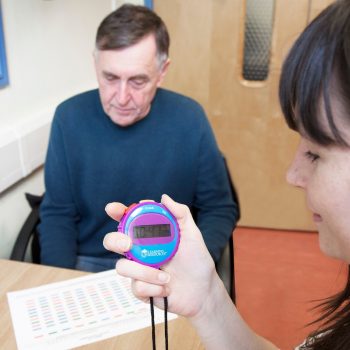The fight to beat Alzheimer’s disease
As we live longer our chances of being diagnosed with a brain conditions such as Alzheimer’s disease increases. September the 21st is World Alzheimer’s day, and Cambridge researchers are taking the opportunity to highlight their research into this growing problem.
Dementia is an umbrella term for several different brain disorders which affect memory, thinking, behaviour and the ability to function in day-to-day tasks, of which Alzheimer’s disease is the most prevalent. There are many types of dementia including vascular dementia, Lewy body and other parkinsonian dementias and Frontal lobe dementia. Common to many, is that the cause of the disease is an increase in certain proteins, including amyloid and tau in Alzheimer’s disease, and alpha-synuclein in Lewy body dementias. In the UK 850,000 people are estimated to be living with dementia.

Professor John O’Brien
Professor of Old Age Psychiatry, John O’Brien, from the National Institute for Health Research (NIHR) Cambridge Biomedical Research Centre (BRC) is leading a team of researchers working to better understand the causes of dementia, and to find new treatments. “We still don’t fully understand why the disease occurs, though we know it develops over many years and is more common in older people, in those with certain genes and in those with some lifestyle factors. Not smoking, making sure your blood pressure and weight is controlled, having a healthy diet, exercise and keeping your mind active are all positive things to keep you healthy. However, age is a big risk factor, so just because you’re fit and healthy doesn’t mean you won’t develop dementia. That’s why we are doing more research to understand why it develops.”
Dementia symptoms affect a person’s daily life; in particular Alzheimer’s disease can cause confusion, memory loss or difficulties with speech. John explains, “It’s unlikely we will find a cure, but what we hope to see in the next few years are better symptomatic drugs, which is something we’re working on to reduce the effects of the disease and give people a better quality of life. Also new drugs that will start to slow the progression of the disease, which can be given early in the illness to help preserve independence.”
Researchers at the NIHR Cambridge BRC are working alongside clinicians at Cambridge University Hospitals to investigate why the disease occurs. “There’s a lot of research happening in Cambridge to understand dementia overall,” explains John. “We have groups looking at the basic chemical changes of the proteins in the brain, cell cultures, stem cells, brain imaging, therapies and genetics.
“Some of our researchers are looking at the brain’s structure and how it functions, and whether changes such as inflammation in the brain are important. We’re lucky in Cambridge to have access to state-of-the-art brain imaging equipment to see the proteins in the brain so we can better understand why and when such changes happen, and what their effects are. We’re also looking at repurposing drugs – licensed drugs already in use for other diseases that might also be effective for people with dementia. Some of our researchers are conducting a prevention study – PREVENT Dementia – to monitor younger people and see if there are any indicators to those who may develop the disease later in life, so we will be able to detect it earlier.”
Dementia is a huge economic and social problem costing the economy £26 billion a year and the Government have invested more money into the UK to fund dementia research, though still a small proportion compared to equally important conditions like cancer. “It’s important we find new treatments as the cost of care is escalating.
proportion compared to equally important conditions like cancer. “It’s important we find new treatments as the cost of care is escalating.
“We have tremendous support from our patients, most of whom want to take part in research. They often report benefits from taking part and have said how this helps them feel empowered. They hope it can help future patients, and some benefits of taking part include the fact they will be amongst the first to have access to new treatments as part of clinical trials, and in the world of brain imaging, access to some of the latest scanning technologies. We work closely with Join Dementia Research, a national NIHR supported register which is able to support our research.”
Being properly assessed for any memory problems or symptoms that may be due to dementia is important, as memory problems can often be due to other medical illnesses or things like depression or anxiety. “Seeing your GP is vital if you’re worried about yourself or a relative. They will be able to assess for some causes of memory problems, and may refer you on to a specialist or memory clinic for further assessment. If the cause is dementia, then early diagnosis offers the best opportunity to benefit from current treatments and services for longer, as well as the opportunity to take part in research studies,” explains John.
Cambridge is one of the leading centres in England investigating new treatments for dementia, including Alzheimer’s disease. “We are really lucky here in Cambridge, the NIHR have been a fantastic support to let us conduct our work. Within the NIHR Cambridge BRC we have world renowned experts, first class infrastructure and excellent facilities – including the latest scanning equipment,” explains John. “Having World Alzheimer’s day is really important, it highlights this type of dementia and our work. But we also need to be mindful; as we are living longer it’s not just our physical selves that we need to look after but one of our most powerful organs– the human brain.”
More information of NIHR Cambridge BRC dementia research can be found here. Further information about the NIHR and dementia research can be found here.
Information about the Cambridgeshire and Peterborough NHS Foundation Trust can be found here



